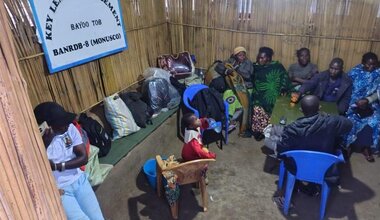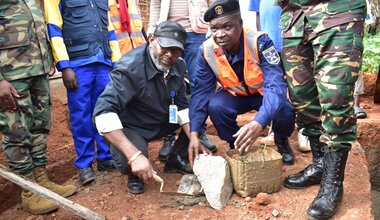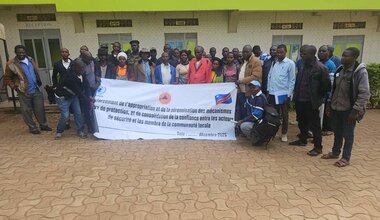UNJHRO trains civil society on the protection for the victims and witnesses of sexual violence
At the initiative of the United Nations Joint Human Rights Office, a workshop on capacity-building for the civil society organizations in the area of the protection for the victims and witnesses of sexual violence was held on Wednesday 7 October 2015 at the headquarters of MONUSCO in Dungu.
About 20 human rights activists, representatives of human right NGOs, civil society organizations, members of the “Commission Diocésaine Justice et Paix” (CDJP) and the “Commission Paroissiale Justice et Paix (CPJP)” in Niangara, Wamba, Rungu, Watsa, Faradje, and Dungu took part in the forum.
The main objective was to enhance the capacities of the actors involved in the fight against sexual violence and to lay the foundations for the establishment of the protection network in Haut Uélé.
This type of network does exist In the North-Kivu; the end-objective in the long run is to replicate the same type of structure in areas of the country where they do not exist so that when MONUSCO leaves one day, a core team will remain to deal with human rights-related concerns.
Several themes were addressed by the workshop:
- the mode of intervention for the Joint Human Rights Office in the protection of the victims and witnesses
- the role of the civil society organizations in protecting the victims and witnesses of sexual violence
- methodology to follow in handling the cases on the protection of the victims and witnesses of sexual violence
- review of the measures for protection of the victims and witnesses.
The core principles to guide the work with the victims and witnesses as well as practical actions for protections
The core principles include confidentiality, respect, non-discrimination, security and the interest of the children. Any protection actor must hold on to the basic principles.
Regarding the practical actions and in anticipation for the prevention of incidents, were listed the change of housing and phone number for the vulnerable person as well as the establishment of an emergency call.
Practical cases leading to the major recommendations were discussed in working groups. The following recommendations were formulated:
- To set up ASAP protection networks in Haut-Uélé,
- To organize training on the protection and security of the traditional human rights activists.
- To financially support the only legal clinic of Haut-Uélé, in Isiro.
Alain Coulibaly
 UN
UN United Nations Peacekeeping
United Nations Peacekeeping





